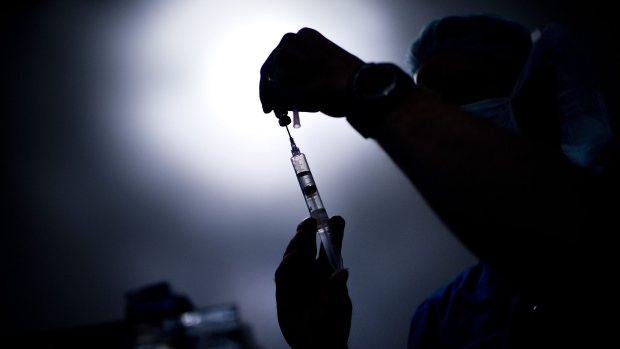Dec 14, 2023
Merck-Moderna Vaccine Cuts Risk of Skin Cancer Returning by Half
, Bloomberg News

(Bloomberg) -- A personalized vaccine developed by Merck & Co. and Moderna Inc. helped prevent the recurrence of severe skin cancer for three years in promising new results from a study.
Patients with severe melanomas who got the vaccine and Merck’s cancer drug Keytruda were 49% less likely to die or have their cancer return than those who got Keytruda alone, the companies said Thursday.
The findings are especially important for Moderna, the Covid shot-maker whose post-pandemic strategy involves developing new uses for its messenger RNA technology to fight flu, RSV and cancer. Last month, Moderna said it expected revenue to fall sharply in 2024 to a level well below analysts’ expectations, sparking concerns about the company’s ability to pay for its ambitious product pipeline.
Read More: Merck-Moderna Vaccine Helps Keep Patients Free From Skin Cancer
Melanoma accounts for only about 1% of US skin cancers, but causes most of the annual deaths from the disease. Making the cancer vaccine involves analyzing the genetic sequence of each patient’s tumor to create a personalized therapy that teaches the immune system to recognize markers of the abnormal growth. In the mid-stage study, patients received the drugs after the tumors were surgically removed.
Durable Benefit
Moderna shares gained as much as 21% on Thursday when the US markets opened, their biggest increase in a year. The company’s stock had lost more than half its value this year through Wednesday’s close. Merck’s shares were down about 1%.
The three-year results are similar to those seen after two years, when the risk of death or recurrence was 44% lower among those who got the drug-vaccine combination than those getting Keytruda alone. Side effects remained generally mild, such as fatigue, pain at the injection site and chills, they said.
“We’ve now answered the one remaining scientific question: Is this benefit short-lived or is it going to be durable?” Moderna President Stephen Hoge said in an interview.
In July, Moderna and Merck began a late-stage trial of the combined treatment in melanoma patients. Such a trial may be necessary to confirm the results, and could take three or four years, Hoge said, though regulators may help make the treatment available to patients sooner.
In an interview on Bloomberg TV, Moderna Chief Executive Officer Stéphane Bancel said the companies want to talk to regulators about getting the skin cancer vaccine approved on a faster timeline. The cancer vaccine could launch as early as 2025, Bancel said in an interview with CNBC.
“If you look at the next 24 months, it’s going to be very dense news flow, very dense product launches,” he said.
Merck and Moderna are testing the combination in other cancers where Keytruda is already used. Earlier this week, the companies said they began a late-stage trial of the combination in lung cancer patients.
--With assistance from Fiona Rutherford.
(Updates with shares in fifth paragraph.)
©2023 Bloomberg L.P.






